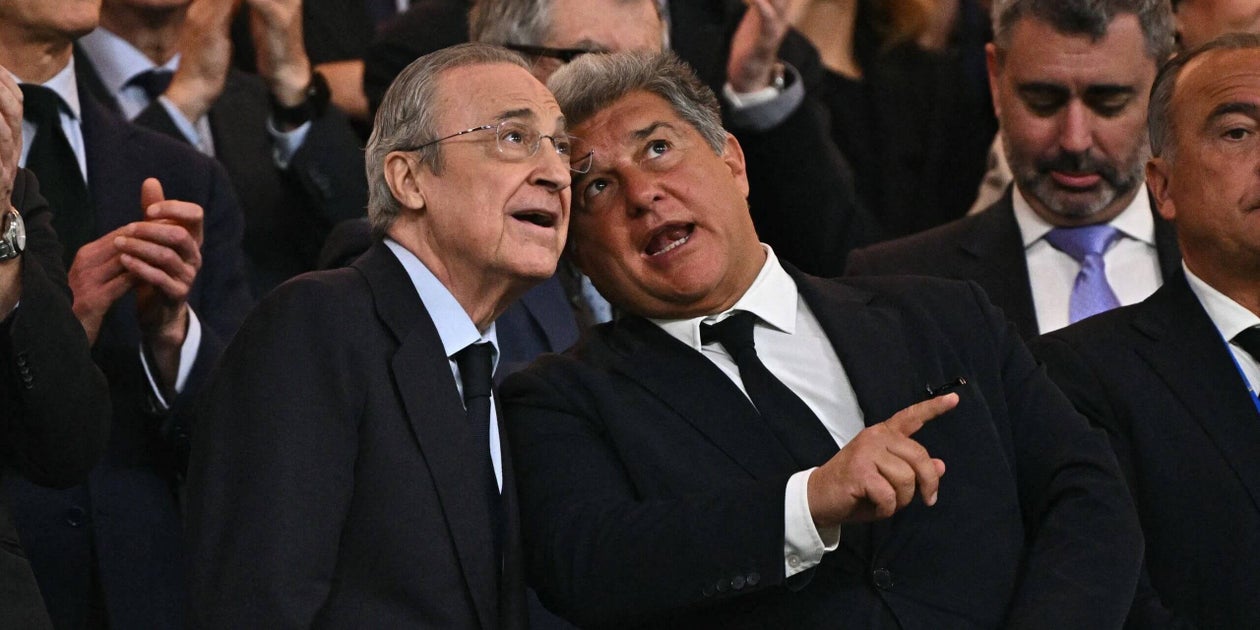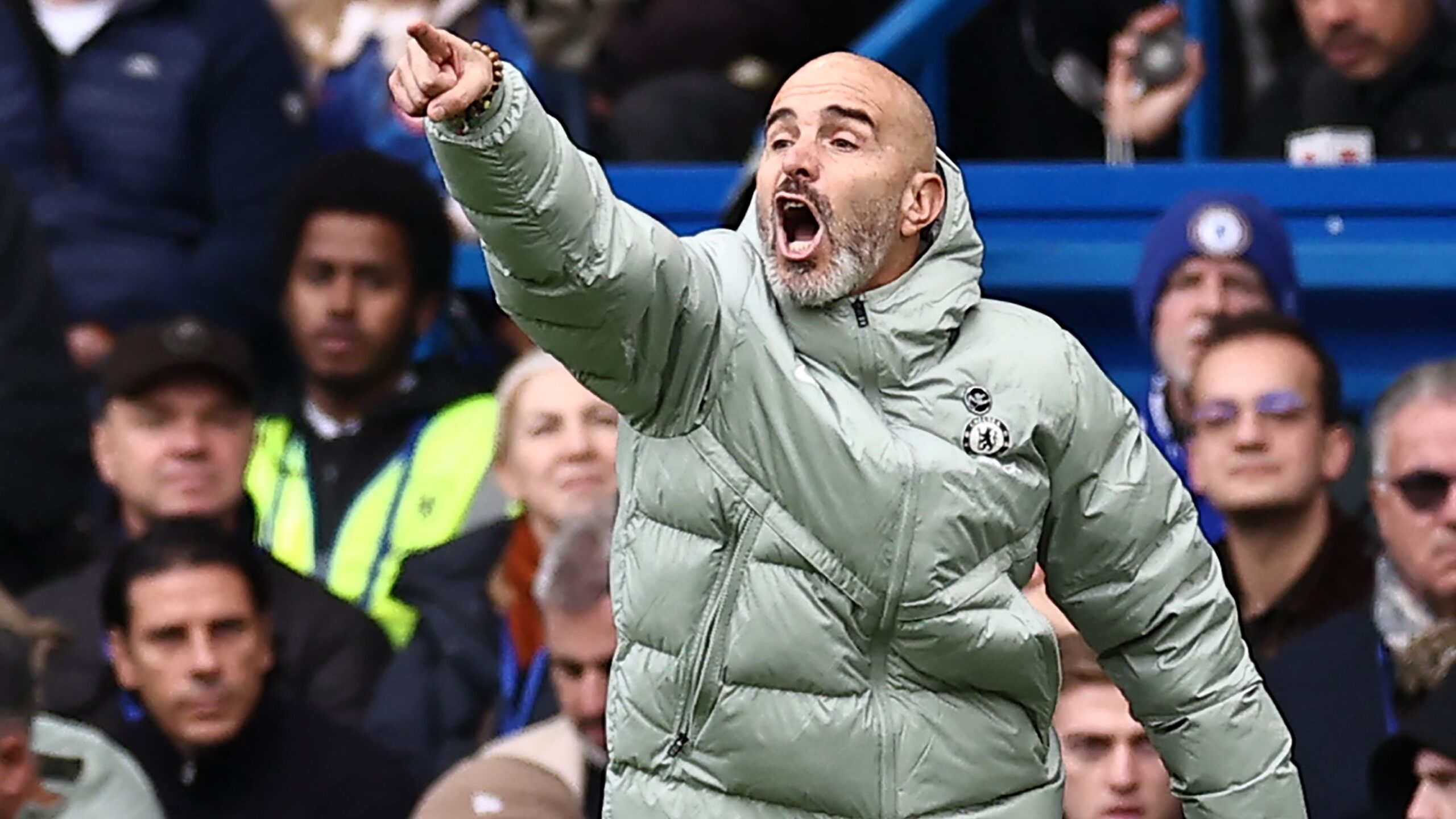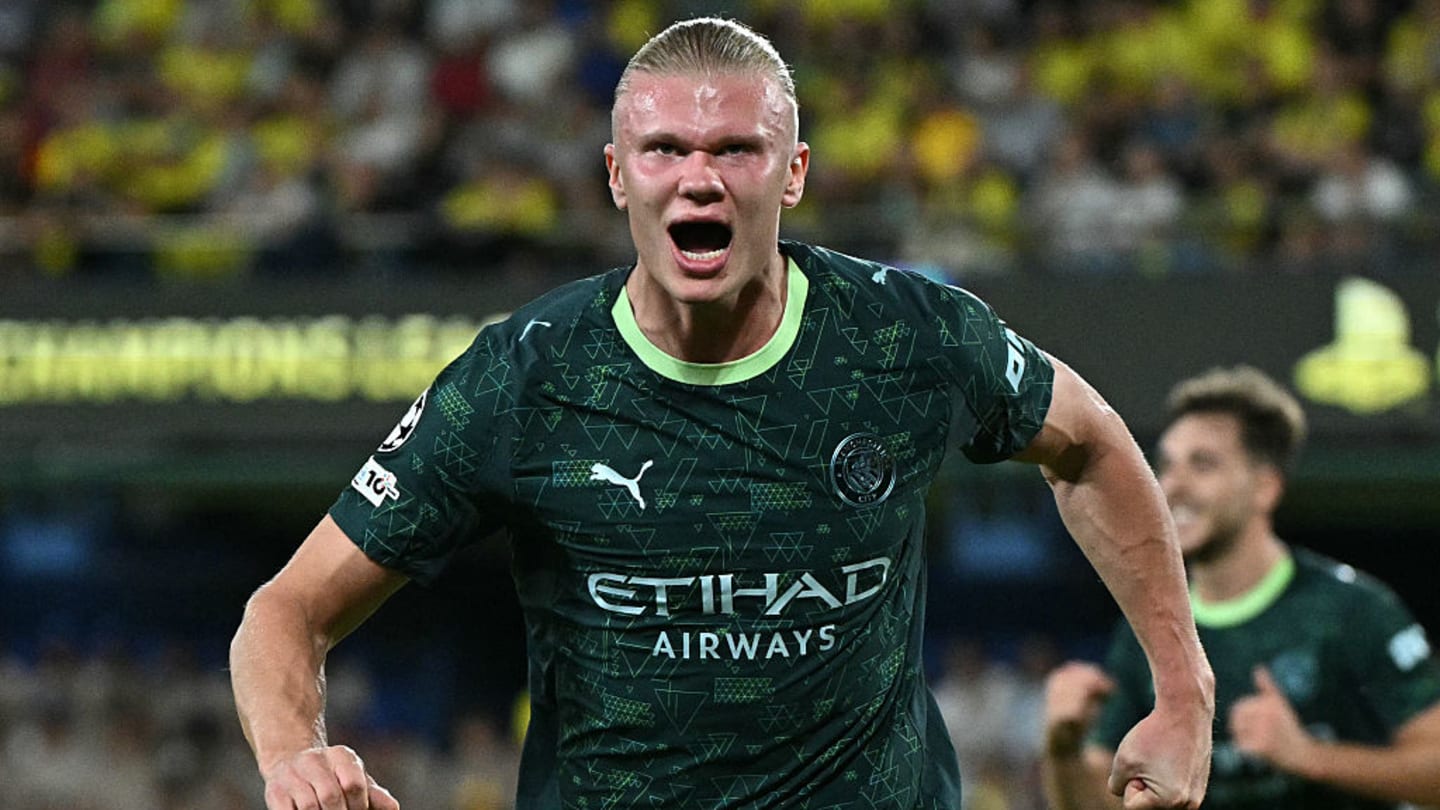Real Madrid against Barcelona is often described as the biggest game in club football, with everyone involved always super motivated and everyone watching usually completely enthralled.
This week, the dramatic collapse of plans for Barcelona to play a La Liga game against Villarreal in Miami — first reported by The Athletic — added extra spice to the compelling and captivating Clasico.
The controversial idea to play a domestic league fixture overseas, pushed by La Liga president Javier Tebas to increase Spanish football’s revenues and exposure, attracted completely opposing reactions from the two sides of the Barca-Madrid divide.
Barcelona president Joan Laporta was firmly behind his team going to Miami. He shrugged off all concerns about tradition and competitive balance, even while many of his own squad did not want to go (as per sources close to the dressing room who, like all those cited here, preferred to speak anonymously to protect relationships).
Real Madrid chief Florentino Perez was dead against the idea, with his club arguing that breaking the traditional home and away format adulterated the competition, while also expressing concern over participating teams gaining a financial advantage.
Meanwhile, Madrid’s official complaints to the Spanish government’s Higher Sports Council, alleging that La Liga did not have the competency to organise the Miami game within official regulations, sought to raise the possibility of Tebas being suspended from his position. Several well-placed sources said this was the most important factor behind the cancellation.
La Liga president Javier Tebas (Arnold Jerocki/Getty Images)
The fallout from all this has defined an especially dramatic week in Spanish football.
At last weekend’s general assembly of Barcelona club members, Laporta tried to thread a delicate path when defending the plan to play a domestic game over 4,500 miles away, knowing that Tebas is not exactly popular with his team’s supporters.
“About Miami, we’re not enthusiastic, but we have to be in everything,” Laporta said. “The (Spanish) Supercopa in Jeddah (Saudi Arabia) provides a return for the club, we get money, the same as Miami. Villarreal and Barca will be those who benefit.”
The Madrid view was clear in captain Dani Carvajal’s Instagram post on Tuesday.
“Hello Senor Javier Tebas, if you do not follow the rules, you adulterate the competition,” the Spain international wrote. “You can’t ignore that rules are being broken. Your competition will be tarnished if the match goes ahead.”
Madrid goalkeeper Thibaut Courtois also spoke out against the Miami plan on the same day, at a press conference ahead of his team’s Champions League game against Juventus the following evening.
“In the NFL, all the team owners voted for (overseas games), here it is the opposite,” Courtois said. “It adulterates the competition, and does not comply with the labour agreement with the players. We all have to play home and away, and Villarreal away is a difficult game.”
These comments were put to the Barca president when he spoke with reporters after having lunch with Olympiacos owner Evangelos Marinakis before their clubs met in the Champions League on Tuesday evening.
“Real Madrid can say what they want, and will do what suits them,” Laporta replied with characteristic chutzpah. “I’m Barcelona president and we will go and play in Miami on December 20.”
Such vehemence looked awkward just a few hours later, when The Athletic broke the news that, on December 20, Barca would actually be visiting Villarreal’s Estadio de la Ceramica after all.

Madrid and Getafe players prepare to pause in their match on Sunday (Denis Doyle/Getty Images)
In the Bernabeu offices, there was quiet satisfaction at Tebas’ plan breaking down. “Most of the football community in Spain is happy about the La Liga 180,” one source at the club said.
Madrid’s players took part in last weekend’s protests against the Miami game, standing still when their game at Getafe kicked off last Sunday. The Barca team also participated — in defiance of their own club hierarchy — by pausing during the first 15 seconds of their match at home to Girona the previous day.
Captains of both sides had been together in backing the resistance of their players’ union to the idea of La Liga games being played outside Spain — and such unanimity was important for the players to have a chance of taking on their bosses.
At both Barca and Villarreal, sources close to the players said that the extra travel and other commitments involved (without any benefits for those actually playing the game) was a factor behind their opposition. There was “relief” among the Barca squad when the Miami game was cancelled, one source said, and a sense of vindication among their Madrid counterparts.
As part of our coverage of the story, we surveyed readers for their reaction. This is how the responses shaped up:

Real Madrid and Barcelona are globally known as bitter enemies, with Clasico meetings having greater significance and tension due to cultural and historical reasons.
But the relationship between the clubs had become more nuanced in recent years. While in some respects the emotional differences are as clear as ever, hard business logic meant they shared similar interests in many areas.
The Barca and Madrid hierarchies have battled together for common causes like the European Super League, which Perez has been pushing for decades, and which Laporta saw as a possible handy solution for Barca’s financial difficulties.
Both clubs also share a commercial partner in U.S. investment firm Sixth Street, who in 2022 provided €360million (£314.8m; $418.7m at current rates) to part-fund the renovation of Madrid’s Bernabeu stadium, as well as €517m in ‘lever’ money for Barcelona in exchange for a share of future TV rights. Both deals were organised by Key Capital Partners, an important financial backer of the Super League project.
However, Laporta has now become closer to La Liga president Tebas, as Barca have looked for more flexibility in meeting the competition’s strict financial sustainability rules. Perez, meanwhile, has remained firmly opposed to almost everything La Liga or its president proposes.
Laporta’s commitment to the Super League project has also appeared to wane, with the Barcelona chief reaching out to UEFA and the rest of the European football establishment, which Madrid continue to shun.
When Barca hosted Paris Saint-Germain in the Champions League group stages in September, Laporta and his counterpart Nasser Al-Khelaifi happily posed together for the cameras before lunch at the Catalan capital’s swish Via Veneto restaurant. Al-Khelaifi and Perez’s relationship was seriously damaged by Real Madrid’s long pursuit of Mbappe, which finally ended with the player leaving PSG to join Madrid in summer 2024.

Laporta, UEFA president Aleksander Ceferin and Al-Khelaifi (David Ramos/Getty Images)
In early October, Laporta was the star invitee at an event held in Rome by the newly rebranded European Football Clubs association. Its president Al-Khelaifi opened his speech by calling the Barca chief a “special guest”, adding: “Friends can disagree but they always come back together for the greater job.”
Back in Barcelona, Laporta said, “We want peace and for the Super League clubs to return to UEFA,” and suggested he could be a peacemaker. Talks have been held between UEFA and A22, the company promoting the Super League, but sources told The Athletic that Laporta’s public comments have surprised those still planning a proposed new competition.
It has also been noted in Madrid that Laporta has proudly talked about how Barca last summer were able to negotiate a reduction in a fine for breaking UEFA’s financial fair play rules from €60million to €15m.
“The two clubs still have their common interests, but as Barca become more financially stable, they can voice their own opinion more, and not have to follow Madrid’s line,” a source familiar with both club hierarchies said.
The Barca and Madrid reactions to the Miami game being cancelled was certainly divergent, and there will be lingering tension in the Bernabeu’s VIP areas on Sunday.
A pre-match meal between directors of both clubs has been part of Clasico tradition through past decades. In recent years, for one reason or another, these lunches have become much less common.
Real Madrid told The Athletic that no official meal will take place on Sunday, pointing to the 4.15pm local kick-off time and saying both presidents would instead meet at the stadium from 3pm.
Once more, the interests and egos of the men who sit at the very top of Spanish football are clashing, in a Clasico week in which the eyes of the footballing world are upon them.
Additional reporting: Pol Ballus, Guillermo Rai, Laia Cervello Herrero


